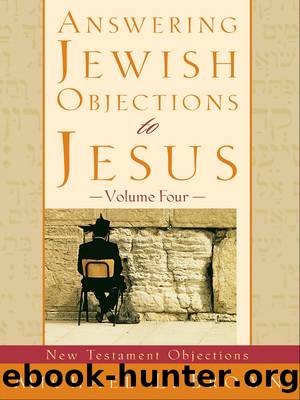Answering Jewish Objections to Jesus : Volume 4: New Testament Objections by Brown Michael L

Author:Brown, Michael L. [Brown, Michael L.]
Language: eng
Format: epub
Publisher: Baker Publishing Group
Published: 2006-12-01T00:00:00+00:00
5.21. The Jesus of the New Testament is hardly Jewish. In fact, he even refers to the Torah as âyour Lawââprecisely because it was not his own.
Jesus stated emphatically that he did not come to abolish the Law and the Prophets but rather to fulfill them, and the primary focus of his earthly ministry was on reaching the lost sheep of the house of Israel. In all his teaching, he made reference to the Hebrew Scriptures, even stating to the Jewish leaders that if they truly believed Moses, they would believe him. After his death and resurrection, his followers continued in this pattern, living as Torah-observant Jews and pointing back to the Tanakh to support the Messianic claims of Jesus. How then can you possibly argue that this very same Law was not his own?
The specific verses in question are John 10:34, where Jesus responds to the Jewish leadership by saying, âIs it not written in your Law, âI have said you are godsâ.â Related to this is John 15:25, where Jesus, again speaking of the Jewish leadership, says to his disciplesâwho were all JewsââBut this is to fulfill what is written in their Law: âThey hated me without reason.â â Addressing this in volume 1 (242, n. 183), I noted:
Some would also point to verses such as John 10:34, where Jesus speaking to âthe Jewsâ says, âIs it not written in your Law , âI have said you are godsâ?â [my emphasis], as if he was saying, âThis is your Law, not mine!â However, such an understanding of this text is completely untenable for the following reasons: (1) Elsewhere in John, Jesus insisted that it was the whole Bible in general, and the Law of Moses in particular, that bore witness to him: âYou diligently study the Scriptures because you think that by them you possess eternal life. These are the Scriptures that testify about me, yet you refuse to come to me to have life. . . . But do not think I will accuse you before the Father. Your accuser is Moses, on whom your hopes are set. If you believed Moses, you would believe me, for he wrote about me. But since you do not believe what he wrote, how are you going to believe what I say?â (John 5:39â40, 45â47; see also John 8:32, where continuing in Godâs Word âmeaning the Hebrew Bible!âis the prerequisite for being a true disciple); (2) When dialoging with Jewish leaders, Jesus alluded to Moses as part of their shared heritage; see, e.g., John 3:14â16; 7:19â23; (3) Jesusâ own disciples are credited with seeing him as the fulfillment of Moses and the prophets: âWe have found the one Moses wrote about in the Law, and about whom the prophets also wroteâJesus of Nazareth, the son of Josephâ (John 1:45); (4) The verse from âthe Lawâ cited by Jesus in John 10:34 is actually from the Psalms (82:6), indicating that Jesus used âthe Lawâ (i.e., âTorahâ) in the broader sense of the Scriptures as a whole, something which was quite common in Jewish usage.
Download
This site does not store any files on its server. We only index and link to content provided by other sites. Please contact the content providers to delete copyright contents if any and email us, we'll remove relevant links or contents immediately.
Christian Ethics by Wilkens Steve;(860)
Christian Ethics for a Digital Society by Kate Ott(779)
Fearfully and Wonderfully Made by Philip Yancey & Paul Brand(771)
God and the Multiverse by Victor J. Stenger(679)
Numbers by Ronald B. Allen(641)
How to Read Slowly by James W. Sire(618)
Christian Ethics: An Introduction to Biblical Moral Reasoning by Wayne Grudem(599)
The City of God by Saint Augustine & Marcus Dods(592)
Morality by Jonathan Sacks(570)
Monastic Archaeology by Unknown(569)
The Technological System by Jacques Ellul(552)
Amish Grace by Donald B. Kraybill & Nolt Steven M. & Weaver-Zercher David L(536)
Death of the Doctor by Unknown(529)
The Disabled Church by Rebecca F. Spurrier;(524)
Jesus: A New Vision by Whitley Strieber(523)
Children of Lucifer; The Origins of Modern Religious Satanism by Ruben van Luijk(513)
Critical Writings by Joyce James;(503)
Redeeming Sociology by Vern S. Poythress(488)
The Church in the Early Middle Ages by G.R. Evans(478)
